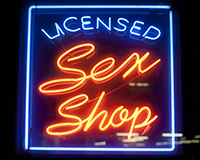 The Supreme Court today allowed Westminster city council’s appeal against a ruling that could have slashed the licence fees that local authorities can charge for sex shops, but referred a row over when such fees must be paid to the Court of Justice for the European Union.
The Supreme Court today allowed Westminster city council’s appeal against a ruling that could have slashed the licence fees that local authorities can charge for sex shops, but referred a row over when such fees must be paid to the Court of Justice for the European Union.
Lord Mance overturned earlier decisions by the High Court and Court of Appeal that sex shop licence fees should not include the cost of administering and enforcing the licensing regime – which would have seen Westminster’s fees reduced from almost £30,000 to less than £3,000 for each licence.
However, the CJEU in Luxembourg will now be asked whether it is lawful for Westminster to require payment in full on applications for a sex shop licence, with the larger element refundable if an application is refused.
Timothy Hemming, who runs sex shops in the Westminster area under the name Simply Pleasure, had challenged the licence fee claimed by Westminster to be paid by sex shops with their applications for a licence. The fee in 2011/2012 was £29,435, comprising £2,667 relating to the processing of the application and £26,435 relating to the cost of administering and enforcing the licensing regime as a whole. The larger amount was refundable whenever an application failed.
Hemming claimed that this system was illegitimate under domestic and EU law, arguing successfully at the High Court and Court of Appeal that there was no basis for requiring successful or unsuccessful applicants to meet the costs of administering and enforcing the regime.
However, Lord Mance, giving the Supreme Court’s unanimous judgment, overturned the decision of the lower courts on that point.
He said that Article 13(2) of Directive 2006/123/EC does not preclude a licensing authority from making a licence conditional upon payment of such fee, and that any such fee would have to comply with the principle of proportionality.
He continued: “But there is no reason why it should not be set at a level enabling the authority to recover from licensed operators the full cost of running and enforcing the licensing scheme, including the costs of enforcement and proceedings against those operating sex establishments without licences.”
However, he said that it was “unclear” whether the requirement to pay the full fee up front, including the larger refundable part, was contrary to article 13(2). This question will now be referred to the CJEU.
Westminster head feared the May 2012 ruling by Keith J, upheld by the Court of Appeal in 2013, could open the floodgates for illegal sex shops and potentially affect public sector enforcement in other areas, including the licensing of street trading and markets.
Nathalie Lieven QC, representing Westminster at the Supreme Court, argued at the appeal in January that its charging regime met the terms of the directive, which simply had the effect that it could not “load up” the cost of enforcement onto the fees that all applicants for a licence must pay, even unsuccessful ones, in order to have a “dissuasive effect”.
She said: “It is fundamental to any authority’s scheme that there is compliance with it. If you don’t have that compliance system, you have not got an effective scheme.
“It is in the public interest to have the scheme and it is axiomatic that it is in the public interest to uphold the scheme.”
Hemming (trading as Simply Pleasure Ltd) and others v Westminster City Council Supreme Court (Lords Neuberger, Mance, Clarke, Reed, Toulson) 29 April 2015
Nathalie Lieven QC, David Matthias QC and Jacqueline Lean (Instructed by Westminster City Council Legal Services) for the appellant
Philip Kolvin QC and Victoria Wakefield (Instructed by Gosschalks Solicitors) for the respondents
Timothy Dutton QC and Robert O’Donoghue (Instructed by RussellCooke LLP) for interveners 1-4
Michael Fordham QC and Hugh Mercer QC (Instructed by Bevan Brittan LLP)for interveners 5-6








